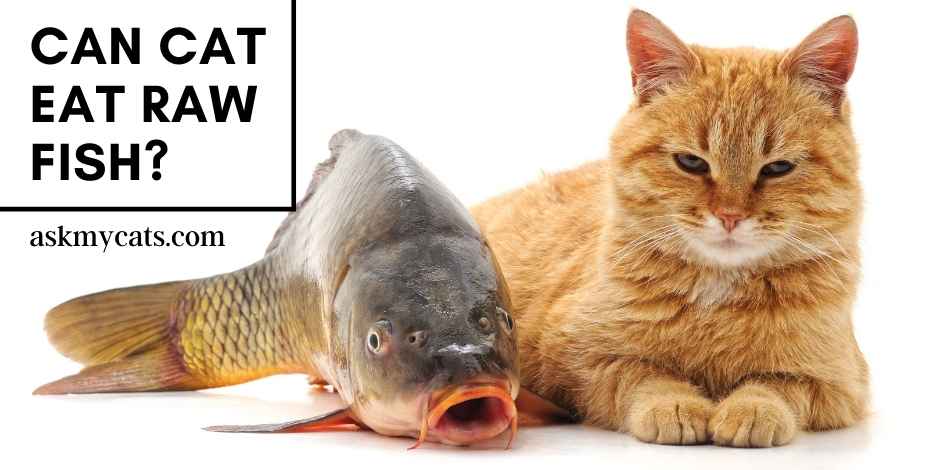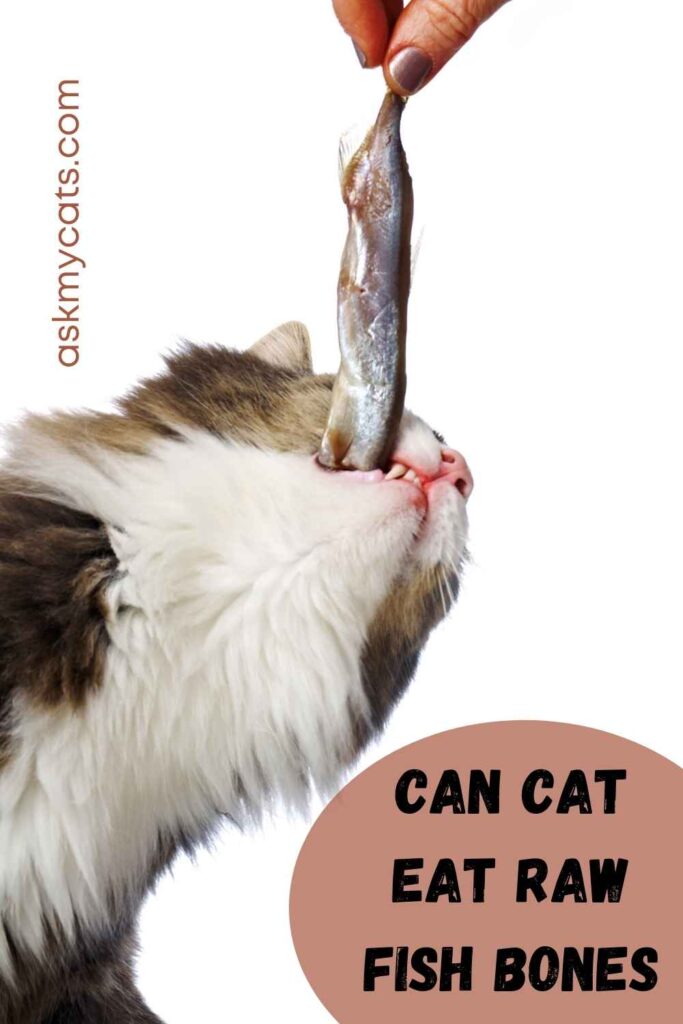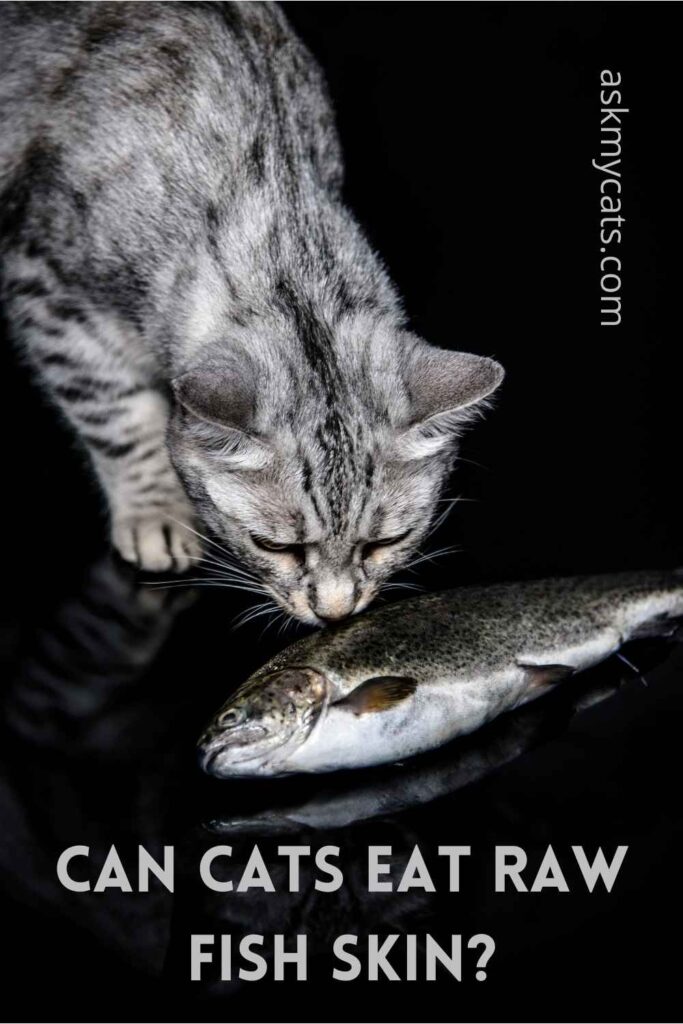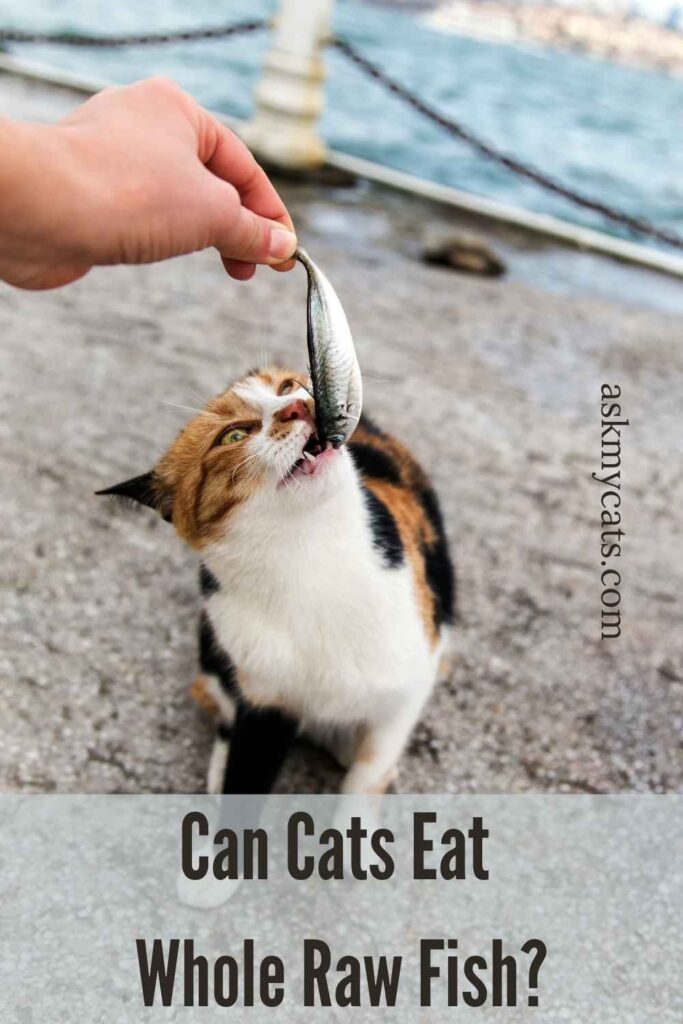Cats are also depicted as consuming fish and drinking milk in popular culture.
As a result, it may be enticing to give your feline companion a piece of tuna as a reward now and again. Should you, though, feed your pet raw fish?
It is not advised to feed your cat raw fish because unfortunately, it can contain bacteria that can cause food poisoning in your pet.
While the supermarket’s “new fish” may seem to be a delicious treat for your pet, you should stop feeding them raw fish just to be healthy.
When you’re going to feed your cat fish, make sure it’s well prepared and free of any potentially dangerous ingredients, seasonings, or flavourings.


Give Your Cat the Perfect Day
Get the Free Ebook!
Can Cats Eat Raw Fish Bones?
No, big fish bones can cause threat to a cat’s neck and get stuck. Fish bones are less likely to pose a problem when you feed fish that are the right size so the fish bones are too small to get trapped in the first place.

Unlike their human masters, cats appear to eat fish with consummate ease.
Also the presence of bones does not prevent them from enjoying their delicacy, whether fresh or baked, while we find it difficult to distinguish the wheat from the chaff.
There are also pet owners who feed their cat’s cod, much to their chagrin. They are still concerned with fish bones. Isn’t it true that you wouldn’t want a fish bone trapped in your cat’s throat?
Fish is considered a healthy meal choice, and feeding your cat the whole fish is ideal.
Bones need not be a problem if the fish is fed fresh. New entire fish bones may not have been exposed to oxygen for as long as fried fish bones.
Since the bones haven’t been oxidised, they’re stronger and easier for cats to crush and chew.
However, fried meat bones, such as those in fish and chicken, can splinter and cause oesophageal injury. Cooked fish bones should be removed before serving since they may damage or hinder your cat’s throat or gastrointestinal tract.
Many cats, on the other hand, have no problem chewing bones, and even though they get trapped, they regurgitate.
As a result, you can begin by feeding smaller fish. Their bones would be thin and compact enough to make for quick digestion.
Tiny fish bones are normally not a concern for cats, according to the vet. If it irritates their lungs, they will regurgitate it to get rid of it.
When it comes to tuna fish bones and other larger fish, though, it’s safer to cut the bones before feeding the skin or meat to your pet. Fishbones are tough and can cause choking, particularly in small cats.
To be sure, feeding your cat fish bones is not a smart idea. Set aside the skin and meat from the tuna, as well as any scraps.
Can Cats Eat Raw Fish Skin?
Yes, you can feed raw fish skins to cats because they are very much fond of them and also a good source of proteins.
Cats aren’t poisoned by fish skin if it’s correctly prepared and baked. Keep in mind that all parts of the fish are susceptible to toxins and spoilage.
Check to see if any remaining fish skin is still edible before giving it to your pets.
Even so, balance is needed because your cat’s growing body necessitates more meat-based meals.

Fish skin is a source of concern because of how it is cooked. Cats are normally fine with well-cooked fish skin that isn’t spiced. If your cat has allergies to some kinds of fish or its skin, you can contact a veterinarian.
Skin fish, contrary to popular belief, is very edible and can be fed to cats on occasion. There should be no problems as long as it comes from a non-toxic fish.
Salmon skin, for example, is very healthy and can provide your cat with an extra boost of health. It’s high in Omega fatty acids, which help your cat’s hair stay healthy.
Fish skin is a favourite of cats because it is both odorous and delicious.
However, if the fish skin has a foul odour and is spoiling, you should dump it rather than feeding it to your pet.
You must, however, exercise caution since certain fish are found to contain heavy metals. In addition, fish is high in histamines, which can cause allergies.
Histamines are helpful because they minimise inflammation, but the fish skin can have a harsh effect on cats with sensitivities.
Aside from that, wild-caught fish will be exposed to elevated levels of toxins as they swim. Since pesticides may bind to their skin and meat, they are a widespread source of concern.
Finally, certain fish, such as swordfish and salmon, are considered to contain high amounts of heavy metals such as magnesium and mercury.
The general rule is that if you can’t eat it, neither can your cat.
Although small quantities won’t harm a cat, you should always be modest when feeding skin fish to your pet to avoid any untoward incidents. These warnings often extend to people.
As long as the salmon skin is cooked properly, it is suitable for cats to eat. Salmon skin is usually almost as nutritious as the flesh, which your cat will enjoy. To avoid mercury poisoning, you shouldn’t give your cat salmon skin or meat too much.
Apart from that, salmon skin can be limited in your cat’s diet. The kitty needs real meat sources for protein and to provide much-needed calories to their bodies. The skin of the salmon isn’t enough.
If cod skin is fried and given in small quantities, it is healthy for cats. Cod, like salmon, absorbs mercury, which can lead to toxicity if consumed in sufficient amounts.
Keep in mind that too much mercury can cause psychological disorders in cats, which can appear as strange behaviour.
Can Cats Eat Fish Heads?
No, cats are not supposed to eat fish heads since they can get choked by the big bones present in fish head.
The fish’s head is the least appealing aspect of the animal. Your cat will consume the meat from a fish head. However, owing to the risks posed by the skull and other bones, care must be taken.
When your cat chews on one of these bigger bones, he or she runs the risk of losing a tooth. It can even cough on a piece of bone it swallows.
The fish head may be steamed or poached. Remove the meat from the oven and set it aside to cool.
Can Cats Eat Fish Guts?
No, cats are not supposed to eat fish guts because it can lead to stomach upsets in cats.
Whole fish or by-products from fish that aren’t fit for human use are often found in processed pet foods. Guts, urine, and bones may be included in this combination.
These are rich in phosphorus and magnesium, which can cause problems for cats, especially those who have kidney or urinary tract disease.
If sensitive cats consume any fish at all, they can cause cystitis and even urinary blockages.
Can Cats Eat Raw Fish Sushi?
No, Sushi of human quality is normally good for humans, although it can cause stomach problems in cats.
Raw fish contains thiaminase, an enzyme that can degrade an essential B vitamin called thiamine in cats. Thiamine deficiency can lead to neurological issues, including convulsions.
Allowing your cat to eat sushi that contains fresh fish is not a smart idea.
Other popular sushi ingredients to avoid for your cat include vegetables or spices from the allium family, cream cheese, and sodium-laden soy sauce.
Can Cats Eat Whole Raw Fish?
Yes, Cats are known to enjoy tuna, and even the act of opening a tin can prompt your cat to appear by your side, eyes wide with hunger. However, you must be cautious about the kind of tuna you feed your cat and the amount you feed it.

First and foremost, feeding tuna to kittens is not recommended due to their limited size and elevated risk of steatitis (a feline intestinal disease) or mercury poisoning from eating the fish.
Tuna is high in proteins, amino acids, antioxidants, and vitamins that are beneficial to your cat and therefore safe to consume in limited amounts.
Salmon is another kind of fish that is high in protein, omega 3 fatty acids, and nutrients that are beneficial to cats, but it, like tuna, should not be the primary source of protein in your cat’s diet.
Salmon (and tuna) may cause cats to become addicted to them, and they can begin to reject their regular food in favour of these more exotic treats. As a result, salmon can only be offered as a special treat to your pet.
How you cook salmon for your cat is also essential. The nutritious value of salmon that has been deep-fried or grilled at a high temperature is likely to be diminished. Salmon that has been roasted, fried, or poached is a better choice for your cat.
Seasonings, dressings, and other additives that are poisonous to cats should never be added to the salmon.
It’s also necessary not to feed frozen, smoked, or cured salmon to your cat because these foods contain excessive amounts of sodium, which can be harmful to cats and even cause death.
If you think your pet has eaten this kind of fish, get them to a veterinarian right away.
Sardines are a smaller fish that can be a tasty treat for your pet. They contain calcium, vitamin B12, and omega 3 fatty acids, all of which are beneficial to your cat’s health.
Sardines, including tuna and trout, can only be fed on rare occasions.
Can Cats Eat Raw White Fish?
Yes, this is because the beneficial Omega-3 fatty acids present in white fish will help to reduce inflammation and the severity of allergic reactions.
The B-group vitamins are abundant in white fish. It’s important to note that light fish has more B-group vitamins than dark fish.
B-group vitamins can be used in white fish. It contains a lot of niacin (vitamin B3), vitamin B6, and vitamin B12. B vitamins help to enhance the health of the skin, coat, and nervous system.
White fish also contains a lot of selenium. It functions as an antioxidant in the body and helps to improve the immune system.
Cats And Fish-A Perfect Love Story
Cats absolutely love fishes because the smell attracts them. Since cats are carnivores, they require a supply of animal protein to stay healthy.

Find a high-quality commercial pet food that is suitable for your cat’s age and fitness.
If possible, consult the doctor before deciding whether to feed your cat so that they can check their wellbeing and ensure you’re giving them the proper nutrition.
Veganism would not allow cats to flourish or prosper. They consume meat in order to provide the nutrients they require.
Although commercial dry or wet cat food is completely appropriate, you can add variety to your cat’s diet by feeding it cooked or raw, fresh meat.
Raw fish is normally good in minimal amounts, but it does not make up a large portion of a cat’s diet.
It’s not the bones, because a cat can eat raw fish bones without harm.
Not only is a fish-based diet nutritionally unbalanced, but it also contains thiaminase, an enzyme that degrades thiamine, also known as vitamin B1.
Furthermore, fish appear to have higher amounts of all that ends up in the oceans. Stuff like heavy metals can be found in wild fish, but farm-grown fish can also be much worse when they are raised in coastal waters and fed essentially waste materials.
Frequently Asked Questions
Is it safe for cats to eat raw fish?
Raw fish, unfortunately, can contain bacteria that can cause food poisoning in your pet. While the supermarket’s ‘new fish’ may seem to be a delicious treat for your pet, you should stop feeding them raw fish just to be healthy.
Can cats get sick from eating raw fish?
Food poisoning bacteria can be found in raw meat and fish, as well as raw eggs. Furthermore, thiamine, an important B vitamin for your pet, is destroyed by an enzyme found in raw fish. Thiamine deficiency can cause severe neurological issues such as convulsions and coma.
Do cats eat raw or cooked fish?
Fish is rarely eaten by wild cats, despite the fact that they do eat raw food. This ensures that taking the additional time and work to prepare fried, filleted fish for your pet is critical to his or her welfare.
Final Words
It’s not so bad that you can stop fish altogether, but it’s something to hold in mind. Cooked fish is distinctive, but not always stronger.
Cooking kills thiaminase, but most B vitamins are still destroyed by cooking, so you’ll need to find another outlet for them. Cooking alters the integrity of bones, making them potentially harmful.
In addition, fish is one of the most popular food allergens and intolerances in cats.
Something cooked for humans is a different storey, as you will potentially end up with stuff that can poison or irritate your pet (like onions or garlic).
Let us know in the comments section below whether your cat is fond of fish or not!
